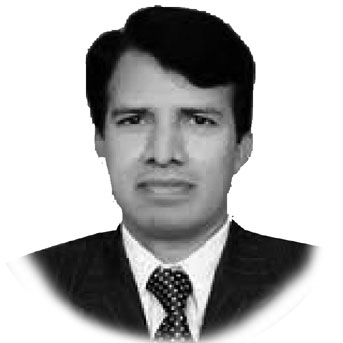Eurasian factor in Pak foreign policy
PAKISTAN is located in a closer geographical proximity of Eurasian region.
In this regard, developing friendly relations with all neighbouring countries and regions in the closer proximity constitute the first and foremost foreign policy objective of Pakistan.
The founding father of Pakistan, Quaid-i-Azam Muhammad Ali Jinnah while outlining the foreign policy of Pakistan in 1948 categorically said, “Our foreign policy is one of friendliness and goodwill towards all the nations of the world.”
In the context of greater Eurasia, Russia is the biggest Eurasian state with Central Asian and Caucasus states as the integral states, constituting the region.
Eurasian region is described in a different ways by different international geographers, strategists and historians.
A wider definition of Eurasia includes the continents of Asia and Europe, making it world’s largest continent. While another definition delimits it a region consists of; Russia, Central Asia and Caucuses which connect Asia and Europe as junction.
For this write-up, the delimited Eurasia will be referred as a significant aspect of the foreign policy of Pakistan.
Historically, Pakistan maintains intimate and spirited linkages with the Eurasian region, especially the Central Asia and Caucuses. These countries remained part of former Soviet Union until early 1990s.
In the post-Soviet era, these states are connected with Russian Federation through number alliances like CIS and CSTO.
Moreover, in the post 9/11 era, Pakistan and Russia came closer to each other for the larger regional interests which include; regional stability, peace in Afghanistan, pull-out for external forces from the region (Afghanistan) and building bridges for economic relations among the regional countries through economic connectivity.
As a dynamic, progressive and democratic Islamic state, Pakistan has maintained its historical linkages with Eurasian states of Central Asia and Caucuses even during the Soviet era.
The people of Pakistan have spiritual and civilisational relationship with the people of Turkistan (Turkistan) the old nomenclature of contemporary Central Asia and the Xinjiang.
There situated the Muslims’ centres of excellence (religious, cultural, education and civilization) like; Bukhara, Samarkand and Khiva, located in West Turkestan (todays’ Uzbekistan).
Similarly, Kashgar is a historical city in East Turkestan (Xinjiang Autonomous Region) has unique historical significance from cultural and civilisational aspects with a history of over 2000 years.
Indeed, tracing the history, the areas up to and beyond River Oxus, Amu Darya River and Kashgar was great civilization known as Turkistan which remained in relation with Persian Empires, Umayyad and Abbasid Caliphates of Muslim Arab world.
Muslims of Subcontinent trace their origin and spread of religious and cultural values from the centre of excellence in modern Central Asia.
While the state and the people of Pakistan remained archeologically associated with the larger Eurasian region, there are contemporary reasons of remaining connected with the region.
The foreign policy of Pakistan laid down the consolidation of “commercial and economic cooperation with international community” in which Eurasian region stands-out as the most attractive area with proximity and general adequacy.
In this regard, the long awaited Turkmenistan – Afghanistan – Pakistan – India (TAPI) gas pipeline may be materialized after establishment of peace in Afghanistan, as promised by Taliban Government.
Suhail Shaheen, the spokesperson of Taliban said about TAPI and railway connection between Pakistan and Afghanistan that, these are “long-term priority projects. We hope to start them [soon]”.
Indeed, besides being in the closer proximity, the states of Eurasian region have been bestowed with abundant natural resources like oil and gas which can be best transported through the Pakistan. In a way, Pakistan is the natural out-let for the oil and gas and other natural resources of the Eurasian states.
Development of Gwadar Port and China Pakistan Economic Corridor will provide all the logistic facilities for the transportation of these natural resources from Eurasian states to international markets.
Alongside Eurasian region Pakistan too has ample natural resources besides being having the status of a pivotal state.
Therefore, ensuring optimal “utilization of its national resources through a regional and international cooperation” is best sought in the foreign policy of Pakistan. Eurasian region is best suited for the optimum utilization of Pakistani resources.
The foreign policy of Pakistan underscores developing friendly relations with major powers and immediate neighbours. Russia and China are two major powers located in the Eurasian region.
Whereas, relations with China have always been the priority in the foreign policy of Pakistan, there has been significant improvement in the bilateral relationship of Pakistan and Russia. Over the past two decades both states made substantial headway in their bilateral relationship.
Safeguarding the national security and geo-strategic interests of Pakistan is yet another significant aspect of Pakistan’s foreign policy which has to be pursued constantly.
In the changing geopolitical environment, Eurasian region has attained an exceptional and greater significance where China and Russia are challenging the contemporary world order under United States.
After, Taliban’s takeover of Afghanistan by defeating US, it (US) may not be able to maintain its status as super power.
Nevertheless, a collective wisdom and unwavering determination at Beijing and Kremlin will decide the future world order.
At regional level, Pakistan will have to play a key role in the stabilization of Afghanistan by convincing Taliban for an inclusive Government while at international level; it has to balance its relationship with all major powers. This is going to be a daunting task for the foreign policy makers of Pakistan.
— The writer is Professor of Politics and IR at International Islamic University, Islamabad.










